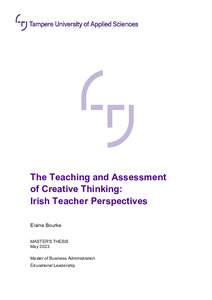The teaching and assessment of creative thinking : Irish teacher perspectives
Bourke, Elaine (2023)
Julkaisun pysyvä osoite on
https://urn.fi/URN:NBN:fi:amk-2023051912179
https://urn.fi/URN:NBN:fi:amk-2023051912179
Tiivistelmä
The role of creative thinking is gaining in political, economic and educational, prominence which has many potential implications for teachers and their prac-tice. Adopting an ethnographic approach, this study analyses the perceptions of teachers of the teaching and assessment of creative thinking. Descriptive survey research used Likert’s five-point scale distributed into five categories: demo-graphic information, teachers’ definitions of creativity, teachers’ attitudes towards creativity within the curriculum, perceptions of their own practice and teachers’ attitudes towards the assessment of creative thinking. To triangulate the data, a focus group interview with primary school teachers was employed, using qualita-tive semi-structured questions to enable thematic analysis through systematic coding.
The aim of this study is to investigate the perceptions and pedagogy of Irish teachers in relation to the teaching and assessment of creative thinking.
Research findings indicated that teachers lacked a clear definition of creativity and often associated it solely with the arts. Only 29% expressed confidence in their skills to teach creative thinking. 71% of teachers believed the Irish Primary Curriculum successfully supports creative development but curriculum overload was identified as a key barrier. 58% of teachers did not believe creativity should be assessed in schools. It was recommended that a clearer curricular definition of creativity be developed, that emphasis be placed on the fostering of creative cultures within schools and that formative teacher assessment be implemented as priority actions.
Key words: creativity, education, assessment, leadership
The aim of this study is to investigate the perceptions and pedagogy of Irish teachers in relation to the teaching and assessment of creative thinking.
Research findings indicated that teachers lacked a clear definition of creativity and often associated it solely with the arts. Only 29% expressed confidence in their skills to teach creative thinking. 71% of teachers believed the Irish Primary Curriculum successfully supports creative development but curriculum overload was identified as a key barrier. 58% of teachers did not believe creativity should be assessed in schools. It was recommended that a clearer curricular definition of creativity be developed, that emphasis be placed on the fostering of creative cultures within schools and that formative teacher assessment be implemented as priority actions.
Key words: creativity, education, assessment, leadership
